Revision module A 学案
初中英语外研版九年级下册RevisionmoduleA教学设计
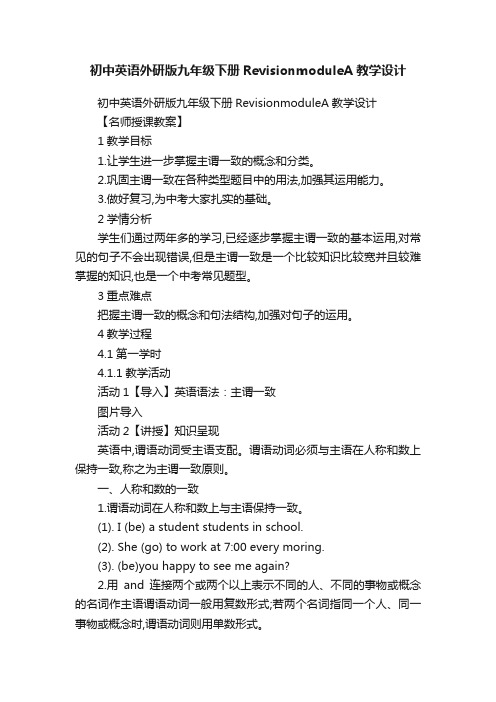
初中英语外研版九年级下册RevisionmoduleA教学设计初中英语外研版九年级下册RevisionmoduleA教学设计【名师授课教案】1教学目标1.让学生进一步掌握主谓一致的概念和分类。
2.巩固主谓一致在各种类型题目中的用法,加强其运用能力。
3.做好复习,为中考大家扎实的基础。
2学情分析学生们通过两年多的学习,已经逐步掌握主谓一致的基本运用,对常见的句子不会出现错误,但是主谓一致是一个比较知识比较宽并且较难掌握的知识,也是一个中考常见题型。
3重点难点把握主谓一致的概念和句法结构,加强对句子的运用。
4教学过程4.1第一学时4.1.1教学活动活动1【导入】英语语法:主谓一致图片导入活动2【讲授】知识呈现英语中,谓语动词受主语支配。
谓语动词必须与主语在人称和数上保持一致,称之为主谓一致原则。
一、人称和数的一致1.谓语动词在人称和数上与主语保持一致。
(1). I (be) a student students in school.(2). She (go) to work at 7:00 every moring.(3). (be)you happy to see me again?2.用and连接两个或两个以上表示不同的人、不同的事物或概念的名词作主语谓语动词一般用复数形式;若两个名词指同一个人、同一事物或概念时,谓语动词则用单数形式。
(1) Betty and David (be )classmates.(2) A teacher and writer (be) coming to our school tomorrow.二、意义、概念一致1.一些集体名词,如family,class ,team等作主语时,若作为整体看待,谓语动词永单数形式;若作为单独的成员考虑,谓语动词则用复数形式。
(1) My family (be) rich ten years ago.(2) My family (be) watching TV2.某些复数形式的单数名词,如news,maths ,clothes 等作主语时,谓语动词用单数形式。
【最新】外研版九年级英语上册RevisionmoduleA学案
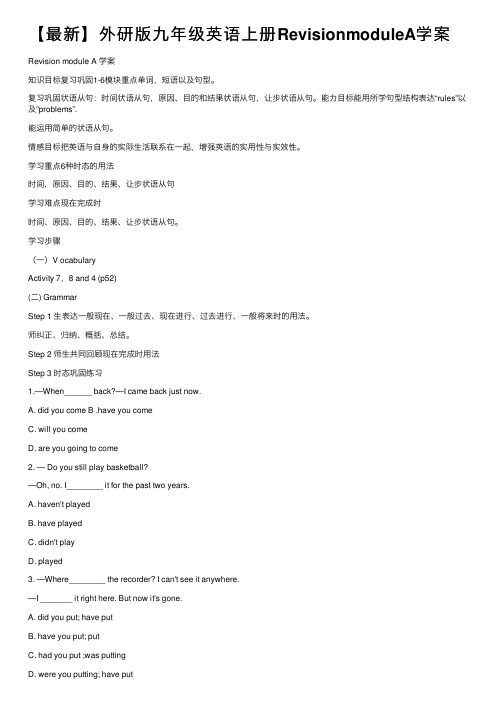
【最新】外研版九年级英语上册RevisionmoduleA学案Revision module A 学案知识⽬标复习巩固1-6模块重点单词,短语以及句型。
复习巩固状语从句:时间状语从句,原因、⽬的和结果状语从句,让步状语从句。
能⼒⽬标能⽤所学句型结构表达“rules”以及“problems”.能运⽤简单的状语从句。
情感⽬标把英语与⾃⾝的实际⽣活联系在⼀起,增强英语的实⽤性与实效性。
学习重点6种时态的⽤法时间,原因、⽬的、结果、让步状语从句学习难点现在完成时时间、原因、⽬的、结果、让步状语从句。
学习步骤(⼀)V ocabularyActivity 7,8 and 4 (p52)(⼆) GrammarStep 1 ⽣表达⼀般现在、⼀般过去、现在进⾏、过去进⾏、⼀般将来时的⽤法。
师纠正、归纳、概括、总结。
Step 2 师⽣共同回顾现在完成时⽤法Step 3 时态巩固练习1.—When______ back?—I came back just now.A. did you come B .have you comeC. will you comeD. are you going to come2. — Do you still play basketball?—Oh, no. I________ it for the past two years.A. haven't playedB. have playedC. didn't playD. played3. —Where________ the recorder? I can't see it anywhere.—I _______ it right here. But now it's gone.A. did you put; have putB. have you put; putC. had you put ;was puttingD. were you putting; have put4. That dinner was the most expensive meal we ________ .A. would haveB. had hadC. had never hadD. had ever had5. Hello. I _______ you__________ in London. How long have you been here?A. don't know; wereB. hadn't known; areC. haven't known; areD. didn't know; were6. My brother________ while he_______ his bike and hurt himself.A. fell ; was ridingB. fell; were ridingC. had fallen; rodeD. had fallen ; was riding7.—Do you know our town at all?—No, this is the first time I______ here.A. wasB. have beenC. cameD. am coming8.We will go and plant trees if it_______ tomorrow.A. won't rainB. doesn't rainC. didn't rainD. wouldn't rain9. You should finish the work before he ________ here.A. leftB. leavesC. is leavingD. will leave10. Don't hand in your papers until class__________ .A. is overB. was overC. are overD. will be over11. My uncle __________ to see us. He'll be here soon.A .comes B. has come C .is coming D. had come12.I won't believe it until I ________ it with my own eyes.A. sawB. have seenC. will seeD. had seen13. In the past ten years, there _______ great changes in our family life.A .had beenB .are C. have been D. wereStep 5 Do exercisesActivity 2 , 3 ,1 and 5 (p50)(三)ListeningActivity9and 10(四) SpeakingActivity 6 and 11(五) ReadingActivity 12(六) Writing Activity 6 and 13,14,15。
2020-2021学年外研版英语八年级下册RevisionmoduleA教案
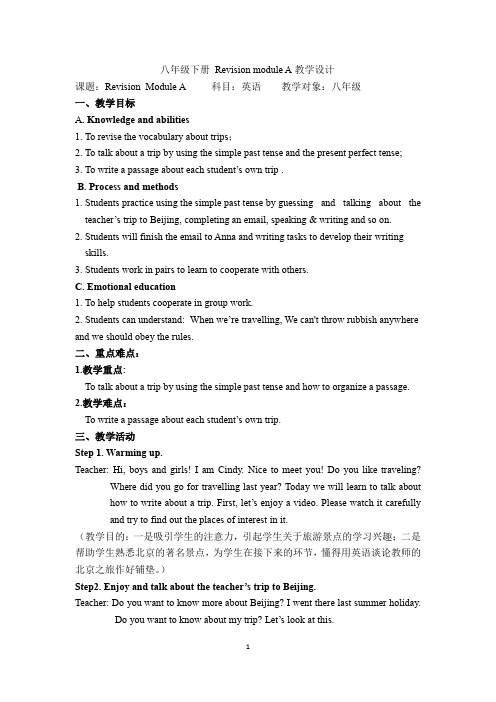
八年级下册Revision module A教学设计课题:Revision Module A科目:英语教学对象:八年级一、教学目标A.Knowledge and abilities1.To revise the vocabulary about trips;2.To talk about a trip by using the simple past tense and the present perfect tense;3.To write a passage about each student’s own trip .B. Process and methods1.Students practice using the simple past tense by guessing and talking about the teacher’s trip to Beijing,completing an email,speaking&writing and so on.2.Students will finish the email to Anna and writing tasks to develop their writing skills.3.Students work in pairs to learn to cooperate with others.C.Emotional education1.To help students cooperate in group work.2.Students can understand:When we’re travelling, We can't throw rubbish anywhere and we should obey the rules.二、重点难点:1.教学重点:To talk about a trip by using the simple past tense and how to organize a passage. 2.教学难点:To write a passage about each student’s own trip.三、教学活动Step 1. Warming up.Teacher: Hi, boys and girls! I am Cindy. Nice to meet you! Do you like traveling?Where did you go for travelling last year? Today we will learn to talk abouthow to write about a trip. First, let’s enjoy a video. Please watch it carefullyand try to find out the places of interest in it.(教学目的:一是吸引学生的注意力,引起学生关于旅游景点的学习兴趣;二是帮助学生熟悉北京的著名景点,为学生在接下来的环节,懂得用英语谈论教师的北京之旅作好铺垫。
外研版英语八年级上册Revision module A教案(表格式)
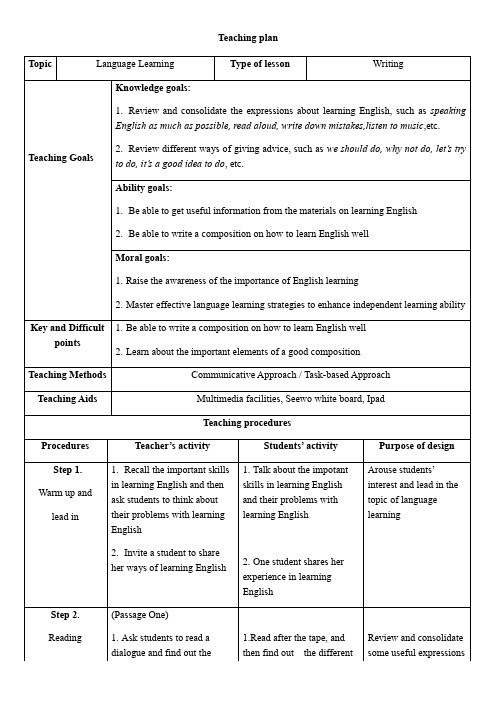
1.Sunnerize and play a video about a foreign teacher giving advice on English learning
2.Homework:
➢ Remember all the useful expressions about English learning
➢ Find out more good ways to learn English and share with the class
Blackboard Designing
listen to the teacher carefully in class
listen to the radio in English
1. Read the requirements of the task and think about the structure, then try to write by oneself
2. Ask S to revise others’ writing in groups according to the writing standards
Teaching plan
Topic
Language Learning
Type of lesson
Writing
Knowledge goals:
1. Review and consolidate the expressions about learning English, such as speaking English as much as possible, read aloud, write down mistakes,listen to music,etc.
Revision module A_ 教学设计
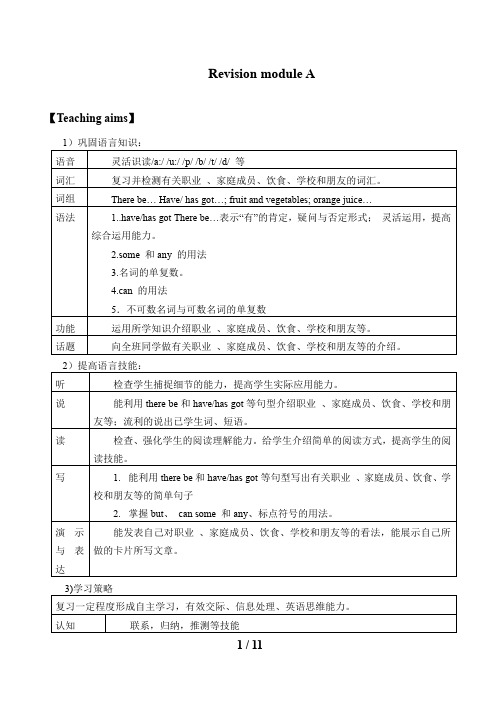
Revision module A【Teaching aims】1)巩固语言知识:语音灵活识读/a:/ /u:/ /p/ /b/ /t/ /d/ 等词汇复习并检测有关职业、家庭成员、饮食、学校和朋友的词汇。
词组There be… Have/ has got…; fruit and vegetables; orange juice…语法 1..have/has got There be…表示“有”的肯定,疑问与否定形式;灵活运用,提高综合运用能力。
2.some 和any 的用法3.名词的单复数。
4.can 的用法5.不可数名词与可数名词的单复数功能运用所学知识介绍职业、家庭成员、饮食、学校和朋友等。
话题向全班同学做有关职业、家庭成员、饮食、学校和朋友等的介绍。
2)提高语言技能:听检查学生捕捉细节的能力,提高学生实际应用能力。
说能利用there be和have/has got等句型介绍职业、家庭成员、饮食、学校和朋友等;流利的说出已学生词、短语。
读检查、强化学生的阅读理解能力。
给学生介绍简单的阅读方式,提高学生的阅读技能。
写 1.能利用there be和have/has got等句型写出有关职业、家庭成员、饮食、学校和朋友等的简单句子2.掌握but、can some 和any、标点符号的用法。
演示与表达能发表自己对职业、家庭成员、饮食、学校和朋友等的看法,能展示自己所做的卡片所写文章。
3)学习策略复习一定程度形成自主学习,有效交际、信息处理、英语思维能力。
认知联系,归纳,推测等技能调控从同伴处得到反馈,对自己在叙述及作文中的错误进行修改交际学习运用恰当词语介绍职业、家庭成员、饮食、学校和朋友等。
资源通过其他资源获取更多介绍职业、家庭成员、饮食、学校和朋友等的信息。
自学策略能借助词汇图掌握单词,学会运用词汇分类记忆法和搭配记忆法记忆单词,形成话题联想的习惯。
关心他人团结互助。
学习与生活相结合,掌握搭配策略。
外研版英语七年级下册 Revision module A 教案
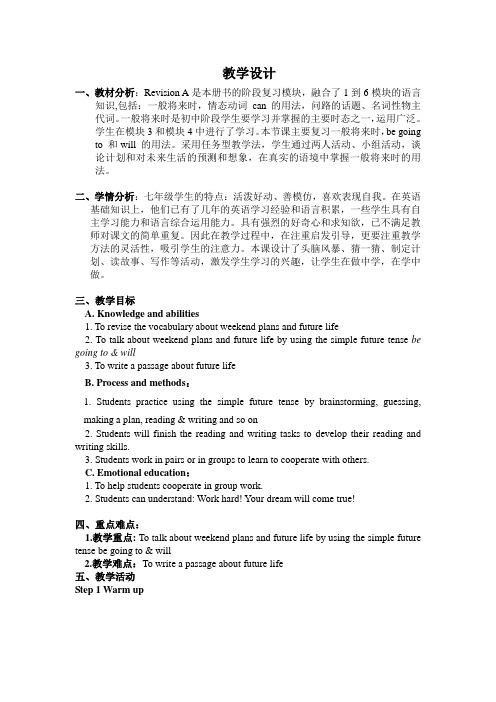
教学设计一、教材分析:Revision A是本册书的阶段复习模块,融合了1到6模块的语言知识,包括:一般将来时,情态动词can的用法,问路的话题、名词性物主代词。
一般将来时是初中阶段学生要学习并掌握的主要时态之一,运用广泛。
学生在模块3和模块4中进行了学习。
本节课主要复习一般将来时,be going to 和will 的用法。
采用任务型教学法,学生通过两人活动、小组活动,谈论计划和对未来生活的预测和想象,在真实的语境中掌握一般将来时的用法。
二、学情分析:七年级学生的特点:活泼好动、善模仿,喜欢表现自我。
在英语基础知识上,他们已有了几年的英语学习经验和语言积累,一些学生具有自主学习能力和语言综合运用能力。
具有强烈的好奇心和求知欲,已不满足教师对课文的简单重复。
因此在教学过程中,在注重启发引导,更要注重教学方法的灵活性,吸引学生的注意力。
本课设计了头脑风暴、猜一猜、制定计划、读故事、写作等活动,激发学生学习的兴趣,让学生在做中学,在学中做。
三、教学目标A. Knowledge and abilities1. To revise the vocabulary about weekend plans and future life2. To talk about weekend plans and future life by using the simple future tense be going to & will3. To write a passage about future lifeB. Process and methods:1. Students practice using the simple future tense by brainstorming, guessing,making a plan, reading & writing and so on2. Students will finish the reading and writing tasks to develop their reading and writing skills.3. Students work in pairs or in groups to learn to cooperate with others.C. Emotional education:1. To help students cooperate in group work.2. Students can understand: Work hard! Your dream will come true!四、重点难点:1.教学重点: To talk about weekend plans and future life by using the simple future tense be going to & will2.教学难点:To write a passage about future life五、教学活动Step 1 Warm up1. Knowledge tree:T: Yesterday I planted a big tree .let’s see how it grows up. It’s a knowledge tree. It’s about the future tense. When we talk about the future, We use be going to& will do. So today we’re going to revise the future tense2. BrainstormingT: Speaking of plans, I have many plans for this weekend. I’ m going to have a party to celebrate my son’s birthday. What are you going to do this weekend?The students answer the question individually.Aim: To warm up the atmosphere and enable the ss to be ready for the class.To revise the vocabulary about weekend plans and the structure be going to Step 2 Games1. A Chain DrillA: Are you going to have a picnic this weekend?B: Yes , I am./ No, I’m not. Are you going to go over your lessons this weekend?C: Yes , I am./ No, I’m not.Are you going to …this weekend?D: …2. Guessing: What is/are he/she/they going to do this weekend?Show some pictures and get the ss to guess.Step 3 Holiday planGet the ss to talk about their plan for the National Day Holiday in pairs A: Hi, Cindy.What are you going to do during the holiday?B: I’m going to have a picnic/go fishing…A: Where are you …….Aim: To practice using be going to by making a holiday plan and presenting aconversation.Step 4 Read a storyT: Everyone is going to have a good time. Look, this is Mr. Brown. But his neighbors call him Mr. be-going- to. Why?Get the ss to read and answer the following questions:Why do people call Mr. Brown “Mr. Going-to- do”?What is Mr. be-going- to do?Aim: To understand the main idea of the passage and improve reading skills .Step 5 The key structure: will do1. Rewrite the sentences: willI'm going to clean my house today.I'm going to wash my car tomorrow.I'm going to cut the trees down next week.2. We often use will to talk about future.Let’s see : What will happen in the future?What will happen to schools?What will happen to people?Get the ss to see the pictures and play their imagination to make up sentences.Aim: To revise the vocabulary about future life.Step 5 Writing1.T: I hope my life will be like this.Get the ss to watch a video about future school.2.T: I want to be a teacher like her. What will your life be like in the future? Let’sdesign it.Get the ss to complete the table with notes individually and then talk about about their ideas in groups.What will you be in the future?Where will you live?How will you go to work?Will you have a big family?How many children will you have?5 . Show time:Get the ss to read their passages to the class.Aim: Enable the students to talk and write about their future life with the simple future tense.Step 6 Emotional educationWork hard. Your dream will come true!六、课后作业Level A. Complete the composition about future lifeLevel B. Select some exercise about the simple future tense to test themselves.七、板书设计Revision Module AWhat are you going to do this weekend?I’m going to……Is she going to……? Yes , she is.Will do教学反思:Revision Module A 是一个综合的复习模块,涵盖了前面6个模块的内容。
外研八上Revision module A 导学案

Revision module A 导学案【预习案】一.熟读每个模块基础单词,根据音标写出下列各词:1. [ˈdɪkʃəneri] ________2. [prəˌnʌnsiˈeɪʃn] _________3.[ˌpɒpjuˈleɪʃn]________4. [ɪˈspeʃəli] _________5. [ˈkeələs] ___________6. [ˈæksɪdənt] __________7. [ˈkraʊdɪd] _________ 8.[dɪˈskraɪb] __________ 9. [ˈriːsɜːrtʃ] ___________10. [səˈsaɪəti] _________二.复习回顾动词形容词、副词比较级,最高级的特殊句式,以及常跟不定式作宾语及作宾语补足语的常见动词,试翻译以下句子:11. This year we are training more carefully . That means we have a better chance of winning.12. It has a population of about seven and a half million, so it is bigger and busier than Cambridge.13. He lives (the) farthest from school, so he takes the underground.14. It allows people to get closer to them.15. In order to protect pandas in the wild, the government is setting up nature parks and developing other plans.【列出我的疑惑】__________________________________________________________________ __________________________________________________________________ __________________________________________________________________ 【探究案】探究点一: Activity 3 on Page 50 Ask for and give advice about learningEnglish ?1. How can I learn new words? B:______________________2. How can I practise my English listening? B:______________________3. How can I improve my English grammar? B:______________________4. What's the best way to improve speaking? B:______________________ Answers:1.Write down new words on small pieces of paper and place them on the wall of your bedroom. Read them aloud when you see them.2.Listen for key words. Just listen a few more times and try to talk about it with your partner.3.It’s a good idea to take grammar notes. Why don’t review the notes in time.4.Why don’t you read English newspapers and magazines? While reading, don’t read word by word, try to understand key words and main ideas.探究点二:动词不定式做目的状语的情况探究1.so that 所引导的目的状语从句在主句和从句主语一致时可以将从句改为to do... 或者in order to do... 不定式作目的状语的简单句。
外研版七年级英语上学期期中 Revision_module_A精品教案Ⅱ
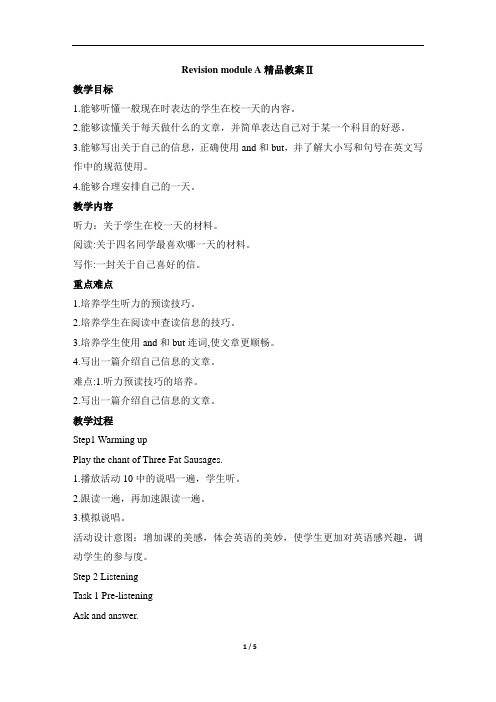
Revision module A精品教案Ⅱ教学目标1.能够听懂一般现在时表达的学生在校一天的内容。
2.能够读懂关于每天做什么的文章,并简单表达自己对于某一个科目的好恶。
3.能够写出关于自己的信息,正确使用and和but,并了解大小写和句号在英文写作中的规范使用。
4.能够合理安排自己的一天。
教学内容听力:关于学生在校一天的材料。
阅读:关于四名同学最喜欢哪一天的材料。
写作:一封关于自己喜好的信。
重点难点1.培养学生听力的预读技巧。
2.培养学生在阅读中查读信息的技巧。
3.培养学生使用and和but连词,使文章更顺畅。
4.写出一篇介绍自己信息的文章。
难点:1.听力预读技巧的培养。
2.写出一篇介绍自己信息的文章。
教学过程Step1 Warming upPlay the chant of Three Fat Sausages.1.播放活动10中的说唱一遍,学生听。
2.跟读一遍,再加速跟读一遍。
3.模拟说唱。
活动设计意图:增加课的美感,体会英语的美妙,使学生更加对英语感兴趣,调动学生的参与度。
Step 2 ListeningTask 1 Pre-listeningAsk and answer.快速询问时间的表达方式,以及重点短语。
T: Before we listen to a piece of material, we need to read the requirements and the form of listening. This is about the table form. So we know it is about our school day. If we know about this earlier, it will be easier to grasp the information we want. So who can tell me the time expressions?Ss: at ... o’clock,on Monday/Tuesday/Wednesday..., in the morning ... have breakfast, have lunch, have classes, go to school, go to bed, have a break, go home, do sports ... Task 2 While-listening1.播放听力材料。
- 1、下载文档前请自行甄别文档内容的完整性,平台不提供额外的编辑、内容补充、找答案等附加服务。
- 2、"仅部分预览"的文档,不可在线预览部分如存在完整性等问题,可反馈申请退款(可完整预览的文档不适用该条件!)。
- 3、如文档侵犯您的权益,请联系客服反馈,我们会尽快为您处理(人工客服工作时间:9:00-18:30)。
Revision module A学案一、请同学回答:(一)C an的用法(二)c an 的三种句式结构:1.用恰当的词填空。
1)-Can you dance?- Yes,I ___.2)-___ he paint? -No,he ___.3)-Can she ___English?-Yes, she ___--2. 把下列句子变为否定句。
1) Lingling can ride a horse.2) He can speak Chinese.3. 把下列句子变为一般疑问句。
1)She can swim.2) She can ride a bike.( )2). --Can you play tennis? -- ______.A. No, I can'tB. Yes, I amC. No, I'm not( )3). Can she ______ her name?A. writesB. writeC. writing二、你们知道如果用英语表达“……地方有……”该如何表达呢?一般采用There be 句型。
看下面的例句:There is a book on the desk.桌子上有一本书。
There are some students in our classroom.我们的教室里有一些学生。
There is a ball under the bed.床底下有一个球。
根据上面的例子,你知道be 的单复数由谁来决定吗?(组内讨论)请完成下面的句子:1、There ______(be) an apple on the table.2、There ______(be) five pictures on the wall.3、There ______(be) twenty-one girls in our class.4、There ______(be) some milk in the glass.5、There ______(be) a pen and two pencils in her pencil-box.6、There (be)some books and an eraser on the desk.7、There (be)some students on the playground.8、There (be)some chairs.9、There (be) a blackbord here.10、There (be) some warter in the cup.11、There (be) a teacher in front of the blackboard.12、There (be) some rice and vegetables on the table.(核对答案,你知道第4、5、12题用“is”还是“are”吗?)请总结一下吧!There be 句型的陈述句结构:看下面的表格,你能发现的There be 句型一般疑问句和否定句是如何构成的吗?小组讨论,总结:1、否定形式:_________________________________________2、疑问形式:__________________________________________肯定答语:否定答语:(注意:如果肯定句中出现some,变否定和疑问应该怎么办呢?) 一起练练吧:1、There is some water in the bottle .(一般疑问句)______ _______ _______ water in the bottle? Yes ,_______ ________.2、There are some books in the bag.(否定句)There _______ ________books in the bag.用some ,any填空1、---- Are there books there? ---- Yes, there are science books.2、---- Is there rice in the bowl? ----- No , there isn’t.3 、There are labs in our school.4 、There aren’t apples in the basket.5 、Would you like milk in your coffee?单项选择1、There many boys in the classroom.A. isB. amC. are2、--- there a girl near here?-----Yes, there is.A. IsB. isC. Are3 、There is a computer the desk.A. inB. onC. to4 、There is apple on the desk.A . a B. an C. the5 、There a pen in the bag ,but there a book in it.A. isn’t ; isB. is; isC. isn’t; isn't6 、Are there students in your class?A.forty-six B. forty-six C. forty six按要求完成句子:1 There _______(be )a pen and two pencils in the pencil—box.2 There are some people in the park .(否定句)There _________ __________ ___________ in the park .3 There is a pencil on the desk . (改为一般疑问句)____ ________ _______ on the desk?Yes,4 There is a ruler in the bag . (改为复数)There _________ _____________in the bags .5 There _________ (be) some food on the desk三、请总结behind、in front of and next to 的用法,想一想,以前还学过哪些表方位的介词?完成下列句子:1、There are some pictures ________________________(在墙上)2、There is a girl _____________________________(在树底下)3、The boy is _________________________(在床上)4、There are some books __________________________(在桌子上)5、The pen is ___________________________________(在书包里) 用所给词的适当形式填空1、There are (you) pens.2、(me) have a nice bag.3、This is (she) computer , and (she)likes it very much.4、These are (we) pencils.5、Are the classrooms behind the gym?Yes , (their) are.6、(his) can play the piano?四、我们用There be 句型表示“某地有某物”,如果表示“某人有什么东西”该如何表达呢?是的,一般用have / has got的表达形式。
如:I have got a brother and a sister.我有一个哥哥和一个姐姐。
They have got many friends.他们有许多朋友。
We have got a computer.我们有一台电脑。
You have got a bike.你有一辆自行车。
She has got two sisters.她有两个妹妹。
He has got a new book.他有一本新书。
从上面的例子,你发现了什么?当主语是他(她)时,have有什么变化呢?请用have got 或has got 填空:1、We __________ ____________ a new house.2、I _______ ________some story books.3、She _________ _________an aunt .4、They __________ __________a new Chinese teacher.5、Tom___________ _____________a new computer.如果要表达“没有”或要问“有没有”怎么办呢?看下面的表格:通过表格,讨论一下have got 句型:肯定形式:_____________________________________________否定形式:_____________________________________________一般疑问句形式:________________________________________肯定答语:_____________________________________________否定答语:_____________________________________________请完成下列各句:1、I have got some brothers.(一般疑问句)_________ _________ _________ _________ brothers?Yes, _________ _________.2、She has got some aunts and uncles.(否定句)She _________ _________ _________ aunts _________ uncles.3、They have got a big classroom. (一般疑问句)_________ _________ _________ a big classroom.No, _________ _________.4、Tony has got some new books. (否定句)Tony _________ _________ _________ new books.5、We have got a big family.(用she 替换we)She ___________________________________________________.(注意:肯定句中的“and ”、“some”在变成疑问句和否定句时,应该如何处理呢?) 综合运用:1、I _______ ________(有)a new textbook.2、She _______ ________(没有)an uncle.3、_______ you _______(有) a new computer?_______, _______ _______(是的,我们有。
